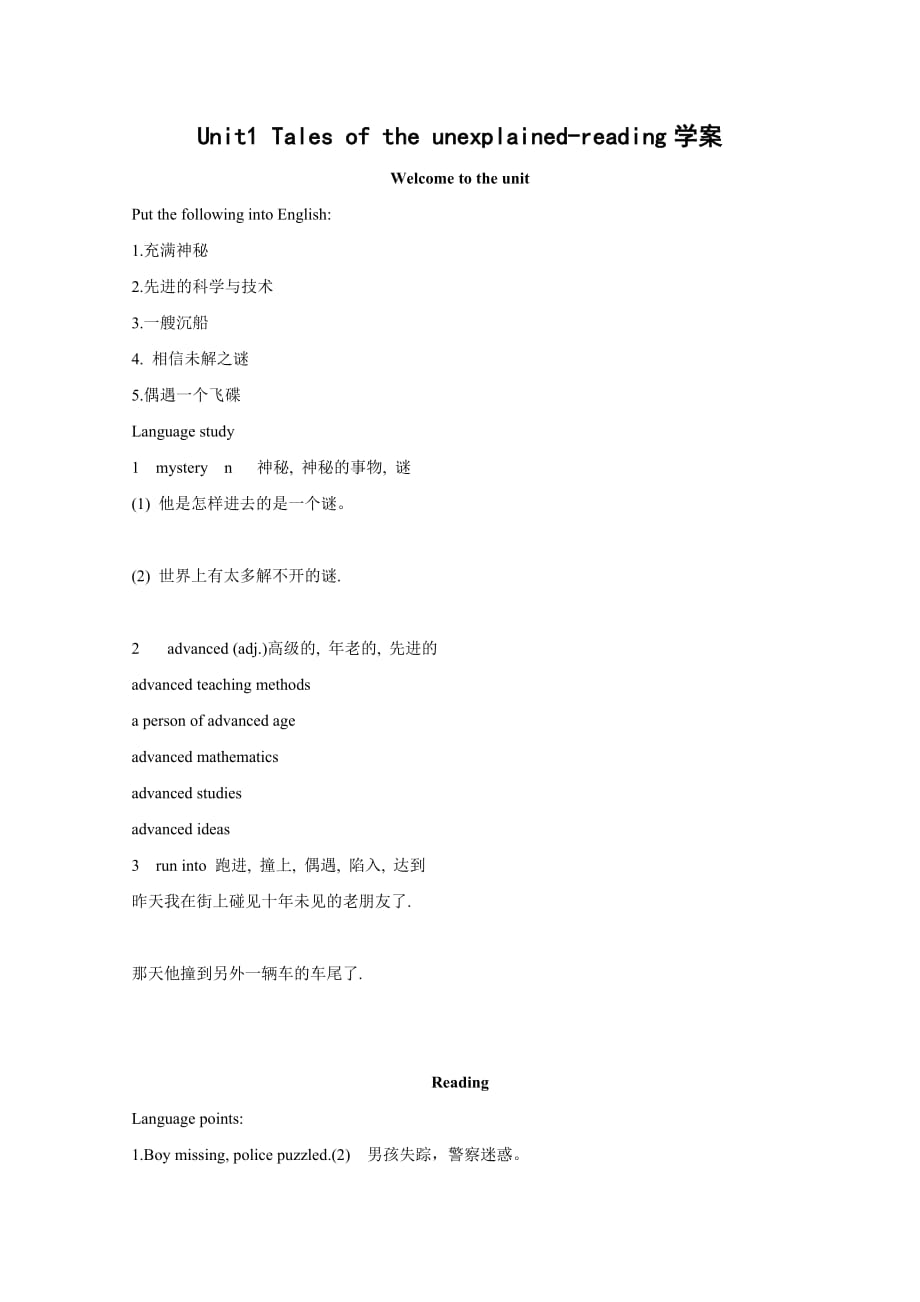《英語:unit1 Tales of the unexplained-reading學(xué)案(牛津譯林版必修2)》由會(huì)員分享�,可在線閱讀,更多相關(guān)《英語:unit1 Tales of the unexplained-reading學(xué)案(牛津譯林版必修2)(4頁(yè)珍藏版)》請(qǐng)?jiān)谘b配圖網(wǎng)上搜索�。
1、Unit1 Tales of the unexplained-reading學(xué)案
Welcome to the unit
Put the following into English:
1.充滿神秘
2.先進(jìn)的科學(xué)與技術(shù)
3.一艘沉船
4. 相信未解之謎
5.偶遇一個(gè)飛碟
Language study
1 mystery n 神秘, 神秘的事物, 謎
(1) 他是怎樣進(jìn)去的是一個(gè)謎���。
(2) 世界上有太多解不開的謎.
2 advanced (adj.)高級(jí)的, 年老的, 先進(jìn)的
advanced teaching methods
a person o
2���、f advanced age
advanced mathematics
advanced studies
advanced ideas
3 run into 跑進(jìn), 撞上, 偶遇, 陷入, 達(dá)到
昨天我在街上碰見十年未見的老朋友了.
那天他撞到另外一輛車的車尾了.
Reading
Language points:
1.Boy missing, police puzzled.(2) 男孩失蹤,警察迷惑�。
= A boy went missing, and the police were puzzled.
missing 和puzzled分別為現(xiàn)在分詞和過去
3、分詞作表語?,F(xiàn)在分詞作表語和主語之間往往是主動(dòng)關(guān)系,表示主語的性質(zhì)���;過去分詞作表語和主語之間往往是被動(dòng)關(guān)系,表示主語所處的狀態(tài).
(1) 消息很激動(dòng)人心�,所以聽到這個(gè)消息學(xué)生們都很激動(dòng)。
(2) 我們被那只嚇人的老虎嚇住了�。
2. … who went missing two days ago
go (+adj.) Link. v 變得…(往往由好變壞)
His hair has _________(變得花白) over the years.
We can’t let the child ______(挨餓).
She ________(發(fā)瘋)when she foun
4、d out that she had failed the exam.
3. show (an) interest in
have an/no interest in
take (no) interest in
feel no/much interest in
develop (one’s) interest in
lose interest (in)
4.However, police found that Justin did
in fact return…
do, does和did分別用于一般現(xiàn)在時(shí)
5�、和一般過去時(shí)
的肯定陳述句中,與動(dòng)詞原形連用,用以加強(qiáng)語氣,在
句中要重讀.
If you do find the book, send it to me.
Do write to me soon!
He does know where the man is hidden.
注意:用以強(qiáng)調(diào)句中的主語,賓語和狀語的,要用
“It is/was … that (who) …”
She saw a thief in the shop this morning.
It was in a shop that she saw a thief this morning.
She lik
6、es to eat in the bedroom.
It is in the bedroom that she likes to eat.
5. …but I heard him put on his favourite CD.
cput on 打開(電燈等)=turn on
稍等片刻�,我就打開電燈。
(1) 穿上, 戴上
He __________ his coat and went out.
他穿上大衣出去了.
(2)上演���, 演出��, 展出
A play written by Shakespeare _____ successfully at the theatre
7�、.
一出莎士比亞寫的戲在劇院成功地上演了�。
6.multi-coloured , white-skinned, strange-looking
復(fù)合形容詞
形容詞+名詞+ed noble-minded 高尚的
good-tempered 脾氣好的
形容詞+現(xiàn)在分詞 good-looking 好看的
fine-sounding 動(dòng)聽的
副詞+現(xiàn)在分詞 hard-working 勤勞的
far-reaching 深遠(yuǎn)的
名詞+現(xiàn)在分詞 peace-loving 熱愛和平的
8、
drug-taking 吸毒的
名詞+過去分詞 state-owned 國(guó)營(yíng)的 heart-felt 由衷的
副詞+過去分詞 well-known 著名的
wide-spread 廣泛流傳的
形容詞+名詞 large-scale 大規(guī)模的
high-class 高級(jí)的
名詞+形容詞 duty-free 免稅的
air-sick 暈飛機(jī)的
6.I haven’t seen Justin since.
since adv 和現(xiàn)在完成時(shí)或過去完成時(shí)連用
表示 “自那以后,后來”.
Her husband died 10 years ago but she has since remarried.
The incident was unlike any other before or since.
He came to England in 1989 and has lived here ever since.
 英語:unit1 Tales of the unexplained-reading學(xué)案(牛津譯林版必修2)
英語:unit1 Tales of the unexplained-reading學(xué)案(牛津譯林版必修2)

